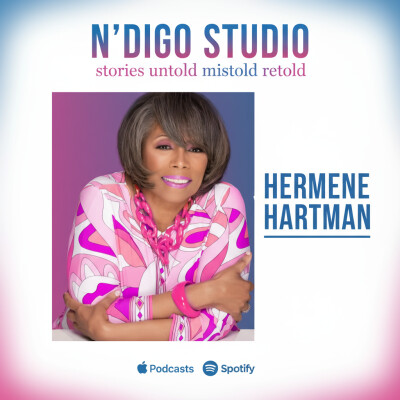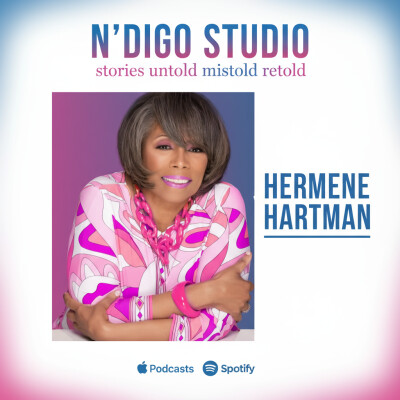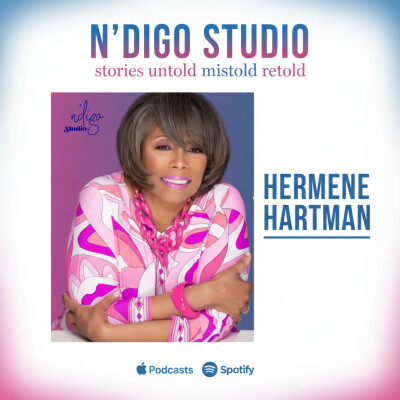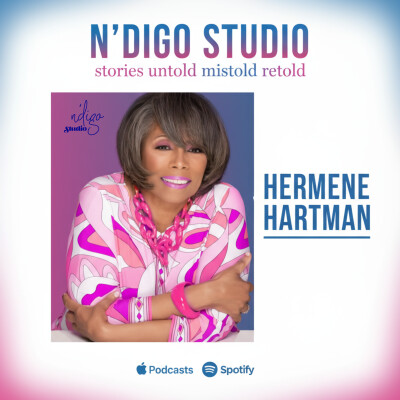- Speaker #0
Hi, I'm Hermine Hartman and I want to welcome you to Indigo Studio. I am so excited today because we've got an exclusive interview with a legend, a legend of broadcast journalism. He's written a book. He's got a fabulous voice. And you have seen him shape the news for Chicago as he has witnessed history as he has given you the news.
- Speaker #1
I see history as a series of stories. It was the 60s when a new culture ushered in free love, drugs, and protests that many thought would change the world. I measured history by covering trials of the century, Conspiracy 7, serial killers like Richard Speck and Charles Benson, Angela Davis, and when 25 bodies were discovered buried in a peach orchard. In Yuba City, California, Chernobyl blew the roof off a nuclear power plant. Poaching was pushing African wildlife toward extinction. And Muhammad Ali revealed he did have Parkinson's disease after 175,000 punches to the head. Before they were history, they were stories. Stories that I covered.
- Speaker #0
He's the face you've trusted for decades. And he's the voice you've heard while anchoring the news here in Chicago and also nationally. He narrates national stories and has presented some of America's most impactful documentaries, 500 to be exact, and still counting. He is Mr. Bill Curtis. Bill, thank you for being with us. Thank you for writing the book. Oh,
- Speaker #1
it's my pleasure and honor to be here to talk about it.
- Speaker #0
All mine. So let's talk about your career. Your career started with radio. It did. K-I-N-D in Independence, Kansas. Tell us about starting in radio and how you got TV in the first place.
- Speaker #1
It was the only radio station in town. When I was 16, I went down and got a work license and then started. Probably the best three years of experience that I ever got.
- Speaker #0
Three years in radio?
- Speaker #1
Yeah, yes. You know, I was in high school and had a nice mentor, the general manager, and every time we'd make a mistake, we'd hear, he lived in an apartment at the end of the hall and knew, oh, here he comes and he's going to chew us out. But he was a sweet guy, learned everything from queuing up. records to rip and reading news guests. And what you do is you get the nervousness out. You have to get experience somewhere. And so you get to be a friend of the microphone and the situation.
- Speaker #0
Then you went to television as a weather reporter.
- Speaker #1
Yeah.
- Speaker #0
And on your first day on the job, you covered the worst tornado ever. And five words really launched that career.
- Speaker #1
Well, you're very wise to pick those up. Five words.
- Speaker #0
Give me those words.
- Speaker #1
For God's sake, take cover.
- Speaker #0
All right, now you learned something, too, with that. You said that you crossed the line between being objective and being personal. But because you said that, you probably saved lives.
- Speaker #1
A lot of people call in, write in, saying, you did save my life. because I had to get people into the basement. I was studying for the bar at the law school. I had just graduated, and I had worked through the TV station, a part-time job. We all have to have it. A friend asked me to fill in for him on the 6 o'clock news. I did. 7 o'clock rolls around, and the general manager said, Well, why don't you stay? We have some high winds coming in from... um K-State in Manhattan, Kansas. So I did and heard this radio cut in, in the studio and broadcasted. It said, a tornado on the ground. It's big and it's on the western edge of the city. Now, we don't immediately go on the air with an alert or a law we want to confirm that, because they usually go up, dissipate. Well, it did not. So the second one said it's wiped out the Huntington apartment complex, 200 luxury apartments just built. So I drew a line between those two points, and they pointed exactly to the Capitol building in Topeka in Kansas and the law school. The whole university there, and residences and shopping malls, churches, the stuff that a city is made of. And I knew that I was standing in the place at the time where what I said was going to mean life and death. And so, give it a word, 26 years old, looking right in the camera. I thought about cussing, crying, hysteria was welling up because suddenly the pressure of having to tell the truth. Now, you can't run away from it. Your feet are in concrete. From the gut, for God's sake, take cover. And I think the sincerity got through.
- Speaker #0
The honesty.
- Speaker #1
And, yes.
- Speaker #0
You just said you were a lawyer. Yes. You were studying for the bar, you passed the bar, you had even signed up for a law firm.
- Speaker #1
Yes, I had.
- Speaker #0
So you had to make some choices between lawyer and news.
- Speaker #1
You go to law school for three years and you say, hey, you know, I've done all this time, maybe I ought to be a lawyer. But I've also got ten years' experience from my early radio days to part-time TV. in TV. And it was 1966. And you could see that network television, especially news, was just growing, just beginning. Edward R. Murrow had come out of World War II, but they were still very influential in radio. And Walter Cronkite had started. And I thought, thought, thought, really was working on it and decided. well, I'll practice law. And so I accepted a job with a trial firm, and they had me pegged as a good trial lawyer. And all of a sudden, the tornado comes through, and I realized what a responsibility it could be, a broadcaster. What you say can affect people's lives, sometimes life and death. So I said, sorry, law. I'm not going to do you this time, and decided to stay in broadcasting.
- Speaker #0
Caught your attention.
- Speaker #1
Sent my tape out. WBBM-TV here in Chicago hired me.
- Speaker #2
Whether you're considering an electric vehicle at work or at home, making the switch may not be as complex or expensive as you think. The tools, resources, and rebates available at commed.com slash ev. Make transitioning to an electric vehicle easier and more cost-effective than ever before. Charge into the future at ComEd.com slash EV.
- Speaker #3
Welcome to Hell's Kitchen, Broadway's hit musical from Alicia Keys.
- Speaker #4
Every song, If I Ain't Got You, Empire State of Mind is all in the show.
- Speaker #3
Meet Allie, a 17-year-old girl full of fire. Meet the musical mentor who changes her life. and her family who lifts her up with exhilarating choreography. Hell's Kitchen is all about finding yourself, your purpose, and the people who inspire you. Hell's Kitchen, playing at the James M. Niederlander Theater, November 11th through 30th.
- Speaker #2
At ComEd, we understand a little help can really make someone's day. That's why we provide financial assistance and billing options to help you pay and manage your electric bill. Use the ComEd Smart Assistance Manager to discover bill assistance and savings options designed with you in mind.
- Speaker #3
Welcome to Hell's Kitchen, Broadway's hit musical from Alicia Keys.
- Speaker #4
Every song, If I Ain't Got You, Empire State of Mind, is all in the show.
- Speaker #3
Meet Allie, a 17-year-old girl full of fire. Meet the musical mentor who changes her life and her family, who lifts her up. With exhilarating choreography, Hell's Kitchen is all about finding yourself, your purpose, and the people who inspire you. Hell's Kitchen, playing at the James M. Niederlander Theatre, November 11th through 30th.
- Speaker #1
So I walked into the studio and in the newsroom at Channel 2 and they said, well, you're a lawyer. Why don't you cover this case?
- Speaker #3
To those who were around Lester in 1966, the hunt for Richard Speck is remembered like Pearl Harbor or the Kennedy assassination, an unforgettable moment in time.
- Speaker #1
People stayed home. They were afraid to go outside. It was basic police legwork that finally paid off, and the help of a tiny witness to the killing of eight young women. The one student nurse,
- Speaker #3
Speck, missed.
- Speaker #0
This was your first story. This was your first case. This was the Richard Speck story.
- Speaker #1
Richard Speck. A serial killer. Yeah. And so I covered that through the trial of six months. And it's... of... was quite a baptism.
- Speaker #0
But you were the only lawyer, only reporter lawyer, only lawyer reporter in the courtroom. So you had an edge.
- Speaker #1
Yes, I did. You're wise. You're a wise lady. You picked that up. And I walked into the reporters, you know, standing. I was the new guy. Didn't know anybody. But I knew the law and I knew something had to change.
- Speaker #0
There was that experience.
- Speaker #1
And it was, you know, here is a guy who had paralyzed a city. The entire population was scared to death.
- Speaker #0
So let's tell that story, because everybody's not going to know what we're talking about.
- Speaker #1
He got a tip that these student nurses were without security, living in an apartment away from the bar where... All the merchant marine people just hung out. So one night, he was high on drugs, and he went over and climbed into the apartment through a window that was open and waited, waited like a snake, while each one came home. And as they came through the door, he would grab them and ask them for money or something like that, and then kill them. Killed each one of them. One by one. Well, what he did not know was that this young girl, Corazon, was hiding under the bed, saw the whole thing. So he put her in an apartment and kept her secret for a year. 24-hour police protecting her. And she walked in the day of the trial, and he said, is the man who committed these crimes sitting here? Yes, he is. Who is it? She points a finger and Richard Speck said, that is the man.
- Speaker #2
Whether you're considering an electric vehicle at work or at home, the tools, resources and rebates available at ComEd.com slash EV make transitioning to an electric vehicle easier than ever before.
- Speaker #3
Welcome to Hell's Kitchen, Broadway's hit musical from Alicia Keys.
- Speaker #4
Every song, If I Ain't Got You, Empire State of Mind is all in the show.
- Speaker #3
Meet Allie, a 17-year-old girl full of fire. Meet the musical mentor who changes her life and her family, who lifts her up with exhilarating choreography. Hell's Kitchen is all about finding yourself, your purpose, and the people who inspire you. Hell's Kitchen, playing at the James M. Niederlander Theater, November 11th through 30th.
- Speaker #2
Thank you. At ComEd, we understand a little help can really make someone's day. That's why we provide financial assistance and billing options to help you pay and manage your electric bill.
- Speaker #3
Welcome to Hell's Kitchen, Broadway's hit musical from Alicia Keys.
- Speaker #4
Every song, If I Ain't Got You, Empire State of Mind, is all in the show.
- Speaker #3
Meet Allie, a 17-year-old girl full of fire. Meet the musical mentor who changes her life and her family, who lifts her up with exhilarating choreography. Hell's Kitchen is all about finding yourself, your purpose, and the people who inspire you. Hell's Kitchen, playing at the James M. Niederlander Theater, November 11th through 30th.
- Speaker #0
As you have covered, and you talk about this in... You give this perspective in the book. Covering the news for you was also a first account of history. You talk about the riots in Chicago after Dr. King's death. And what was that like for you? Because you had some dangerous moments with that.
- Speaker #1
Yes. The news came down in the evening. I was in the newsroom. It was April 4th,
- Speaker #0
1968.
- Speaker #1
So we better look out because all hell is going to break loose. And sure enough, in the morning, we got in a crew car and drove into the west side on Madison. And it was when people were being released from their jobs and told to go home. But broadcasting kind of abdicated its responsibility and did not give a warning. Hey, you're driving into mobs. These mobs are pulling drivers and people out of the cars and beating them, in addition to setting fire along Madison. And I'll never forget that. You know, I saw the very first fires start. You know, a young man with kerosene, they'd splash it on the door, and then they'd light it. And these old houses, Chicago, essentially, its history, went up. And 20 blocks straight on Madison, 20 on Roosevelt Road, 20 on 63rd Street, it was a city on fire.
- Speaker #0
You were actually in the car, watching, covering, filming.
- Speaker #1
Yes. I was sitting in the back seat and my cameraman was in the front, and a large chunk of concrete came through, hit him, knocked him out. This is kind of amazing. That was in April when King was shot. Then just a month, a little over a month, Bobby Kennedy.
- Speaker #0
June 5, 1968.
- Speaker #1
Was shot in L.A. And then almost within a month, we had the four days of August for the Democratic National Convention when 10,000 demonstrators come to town. But this is also interesting. They did call out. They pressed the button. President Johnson and Mayor Daley said, we need some help. 11,000 cops. were on duty in Chicago. 7,000 federal troops were standing by out of O'Hare. 5,000 National Guard were on duty along Michigan Avenue and 1,000 Secret Service here and there. So we're no strangers to having federal troops. In the famous intersection confrontation at Palo in Michigan, where the police had a single line. Stretching across Michigan Avenue. I was in the top of a car looking down literally this close. We thought he'd be interested in this. The Poor People's March.
- Speaker #0
In Washington?
- Speaker #1
No, right here. And they were in a parade. They had a permit. And they were riding in a wagon. And they wanted to get to the International Amphitheater 40 blocks away. And so the police let them through, but the demonstrators thought, oh, well, they're letting us all through, and we're going to go to the amphitheater. But the police then closed the line. Suddenly you have the tension and pressure of the 10,000 demonstrators pushing against a single line of policemen. Police who were young, they were not trained in crowd control, and They had a, they say a chip on their shoulder. No, what they felt was, sorry, I go back and that's what you need to do when you write a memoir. I can see it all over again. This is our city. You've come to our city.
- Speaker #0
To destroy.
- Speaker #1
Yeah. And you think you're gonna get away with it? They went in and they cleared, I'm sorry, 10,000 people in 15 minutes. In 15 minutes. A friend of mine for Time Magazine was in the Hilton, is right in front of the Hilton, and he saw what I did not see, which were 200 police reinforcements moving up Balbo and pushing into, and the protesters recoiling, which... put the pressure on the police line there. So to this day, I'm not sure who was responsible for that confrontation. Were the police just tired of it and clearing, or were the demonstrators?
- Speaker #0
You've covered history. And I think one of the stories that you covered, as a reporter, you can change, you can bring about change. You brought about legislation, not only change, but legislation. And that was with the story about Agent Orange. What is the effect of Agent Orange?
- Speaker #1
This is often the case with investigative reporting. We ran into a wall almost immediately. Maude DeVictor was my... A whistleblower working for the VA's regional office here, and she gave me, sent over a list of 12 veterans who were complaining of symptoms that the doctors didn't know what to do. I saw it, and I had done the defoliant story years earlier, so I kind of knew that if these complaints were real... It was biological and chemical warfare that we were using and probably innocently affected our own troops. Because, and now, the reason it took a lawyer's work and a lot of work was that there were 40 years of research that farmers had been using this to take away the trees and the brush. And they said, well, it's harmless to humans, so we can do anything we want, you know. Well, we were getting something different. We were getting the GIs who were in the jungle and saying, well, you know, we saw it dripping. It's supposed to work in two weeks, you know, to make the leaves fall off the trees. We saw it working in an hour. And it was dripping off and down to, we were all, you know, saturated with it. And then we began having these diseases. And came back, and one after another proved that, I mean, to me, something was wrong. So, on the one hand, I've got what happens almost in every investigator. report a body of work that says one thing, but I've got anecdotal evidence that says another. So I worked, and Dow Chemical Company sent out five lawyers, and they were going to kick my ass, young lawyer. And so they go through there. case, strong case. And I said, you say you have evidence that it's harmless. Do you have evidence that it was not harmless? Not harmless meant that they had actually done the testing on its effect on human beings.
- Speaker #0
Where are we today, Bill, with news? What's our news coverage today? What's the media landscape today? Social media, artificial intelligence?
- Speaker #1
No.
- Speaker #0
Where are we?
- Speaker #1
Nobody knows. It's an easy way out. But nobody knows. The old networks, ABC, CBS, and NBC, have all been attacked by the administration. And let me use CBS, my old home, as an example. They wanted to buy, Paramount wanted to buy CBS. CBS wanted to sell $16 billion, something like that. But they had this little nugget of truth called news. And so, you know, they had to deal with that. So, because the news guys, they're not going to sell themselves to anybody to come through. So there was a compromise, and the compromise with the buyer was that, okay, we'll sell it, but there's going to be a bias monitor that looks over every newscast, every story of 60 Minutes, the best.
- Speaker #0
Every newscast.
- Speaker #1
Well, yes, and to see if it meets.
- Speaker #0
So freedom of the press is gone? Interpretation freedom of the press? Perception of freedom? What do we call it?
- Speaker #1
You know, freedom, we want to be independent.
- Speaker #0
But you never had that.
- Speaker #1
No, no, we never did.
- Speaker #0
That's not norm. That's something new.
- Speaker #1
And the reason you want independence is that Thomas Jefferson didn't like reporters. Who does? We're telling him what they're not doing right. But he knew that... To have a democracy where the power is in the hands of the people, and where do they get their information?
- Speaker #0
It's got to be the press.
- Speaker #1
The press. So he wrote in the First Amendment. Freedom of the press, freedom of speech. And without that, we're in bad trouble.
- Speaker #0
Bill Curtis, you've had a fabulous career. You've told us wonderful stories. You've brought change. and truth and for me personally and I don't know if you know it you've been a mentor One, as I read your book, I teared up a couple of times because I saw something. Warner Saunders kept telling me this and I didn't, I didn't get it. He kept saying, you are duplicating TV news in newsprint in a new way because you know TV and you can write. My publisher's page was Walter. It was the opinionated something. But that cover story. was the persistence. I'm persistent. I think I learned that from you. And I thank you.
- Speaker #1
We'll cry through it together.
- Speaker #0
We'll cry together. We'll go for lunch and Donna can go with us and we'll just have our tears. But thank you so much. And Whirlwind is a book you should read. It's a contemporary history. But if you are in journalism, it's a must. I told your wife, I told Donna. I've got some friends at Northwestern. That book needs to be in their reading material. Absolutely. Thank you.
- Speaker #1
I want you to stay with this because you've got talent and we need you. We need people like you because this is the best interview in pitching a book that I've run across.
- Speaker #0
Thank you. Thank you. We got to tell these stories, but we got to tell the truth. That's why I started Indiegogo. The stories on black people were so bad. And it's like everybody's a criminal. Everybody comes from this crazy household. Nobody's got education. It was like, where are the people I know? And you helped me with that. And I don't think you even know. Do you remember the story we did of you when you went to Africa? You know, I was in Indigo. I was in Indigo story.
- Speaker #1
Was it really? Wow.
- Speaker #0
I got to find that paper for you.
- Speaker #1
Please.
- Speaker #0
Thank you, Bill Curtis.
- Speaker #1
That's in the book.
- Speaker #0
It's in the book. I read it in the book and it triggered. I said, oh, we wrote about that. Thank you.
- Speaker #1
Well, thank you.
- Speaker #0
Thank you. I'm Hermine Hartman with Indigo Studio with Bill Curtis. And he said, keep doing what we're doing. And we will.
- Speaker #5
Girl's Studio





